|
Wiseness at the piano - Interview with Cedar Walton
|
 |
There is a sensation of golden
achievement around the person of Cedar Walton, as he talks about his own music.
It is as though all the tensions and the creative thrusts which can have
accompanied the life and career of one of the most prominent bop pianists had
been brought together and extinguished, giving life to a serene, shining vision
of his work. Nowadays, the relationship that Walton has with his own music
expresses the most complete satisfaction, that of a musician who is, first of
all, a man who can afford to express himself freely, without having to impose
his voice.
 As I could notice during the nights he played on the
stage of Chet Baker, a renowned jazz club in Bologna, in the last days of October
2001, for Walton playing live is not the theatre of a suffering search for
creativity anymore, but rather the result of its overcoming. As I could notice during the nights he played on the
stage of Chet Baker, a renowned jazz club in Bologna, in the last days of October
2001, for Walton playing live is not the theatre of a suffering search for
creativity anymore, but rather the result of its overcoming.
«I feel it's not
the moment to impose myself some kind of objective anymore. To say it better,
without giving the idea that I'm just surrendering myself to music, I feel I
can just follow my musical path, without looking for any big goal. During my
career I had the possibility to play with the most distinguished men
representing modern jazz. From the late Fifties onward I was able to transform
any decade of my activity in a series of achieved objectives, accomplished
projects, fulfilled musical desires. Today I can consider myself satisfied in
terms of human and musical encounters: having been at the side of Kenny Dorham,
Art Farmer, J.J. Johnson, John Coltrane, Art Blakey and many more has given me
good fruits both immediately and after a longer period. In the first case I'm
referring to the satisfaction of finding myself at the side of men whose
absolute value made it possible for me to make my music evolve, even when I was
just playing as a member of someone else's group. In relation to it, I remember
my great experience with Art Blakey in particular. I was just 28 when I joined
him. In just a few years we made nothing else than playing and travelling: we
were performing almost every week. We didn't know the meaning of the words 'free time'. Together we made many records [we remind
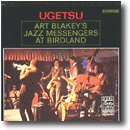 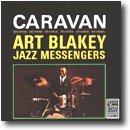 Caravan
(Riverside),
Ugetsu
(Riverside),
Buhaina's Delight
(Blue Note)
and Free for All
(Blue Note) among others], in practice one almost every
time we had six or seven pieces ready to go on tape. It was an extraordinary
period; it could not have been different since Blakey was himself the most
extraordinary of the leaders. He would always encourage and urge me to compose
and arrange. That was a good way to become confident with my capabilities,
testing them under the guide of such a musician. The period I spent with the
Jazz Messengers was by far the best experience that has ever happened to me: I
couldn't think of a better situation for a young jazz musicians». Caravan
(Riverside),
Ugetsu
(Riverside),
Buhaina's Delight
(Blue Note)
and Free for All
(Blue Note) among others], in practice one almost every
time we had six or seven pieces ready to go on tape. It was an extraordinary
period; it could not have been different since Blakey was himself the most
extraordinary of the leaders. He would always encourage and urge me to compose
and arrange. That was a good way to become confident with my capabilities,
testing them under the guide of such a musician. The period I spent with the
Jazz Messengers was by far the best experience that has ever happened to me: I
couldn't think of a better situation for a young jazz musicians».
«But after a longer period I could notice some other
effects originating from my experiences. I'm referring to the rising of a new
vision of jazz music inside of me, of a new perspective from which to look at
my music making compared to the one I had in the first decades of my career.
Nowadays, thanks to my past experiences, I can afford to dedicate myself
exclusively to the refinement of my own music. I can avoid a series of things
which bother many musicians at the beginning or in the middle of their career:
the necessity of having ‘important'
collaborations; the desire or curiosity to measure oneself with different
instrumental situations, looking for one's ideal kind of ensemble; the search
for a style in which to recognize oneself or the attempt to move far from one's
consolidate style, looking for some kind of renewal. Now all these things
doesn't bother me anymore because I fell I've reached the last enjoyable period
of my career, which I'm living with much pleasure. If I don't dream of playing
with this or that musician anymore it is because I'm deeply satisfied with the
persons I've already played with. So I feel that now I must dedicate my
attention exclusively to playing music and make so that it becomes a moment of
pleasure and gratification for both those who listen to it and the young
musicians who play it at my side».
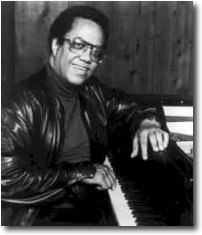 Blakey was not the only eminent drummer among the
great personalities of modern jazz with whom Walton gave life to partnerships
worth a special mention in the history of bop. Passing from king Art's court to
the leadership of his own groups, Walton associated with Billy Higgins, in a
trio (featuring David Williams on bass) which is the most evident example of the
pianist's musical art. Many recordings, both in studio and live (such as the
three volumes of Blakey was not the only eminent drummer among the
great personalities of modern jazz with whom Walton gave life to partnerships
worth a special mention in the history of bop. Passing from king Art's court to
the leadership of his own groups, Walton associated with Billy Higgins, in a
trio (featuring David Williams on bass) which is the most evident example of the
pianist's musical art. Many recordings, both in studio and live (such as the
three volumes of
 The Trio, recorded live right in Bologna in
1985
and published by
Red Records) are there to testify that. The Trio, recorded live right in Bologna in
1985
and published by
Red Records) are there to testify that.
«Billy Higgins was always
a perfect drummer for pianists, simply because he was always listening to them
carefully while he was playing with them. When I played soft he played soft;
when I played loud he played… not so loud! That means that he always had ears
for what I was playing and that his understanding of my touch was total: he was
playing for me and not just for himself, as it's the case with more than a
drummer. Then, when I left some kind of open space in my line, he would
immediately fill it up, to avoid that my music lost its presence. These and many
other things made him that great drummer we all know. We'll miss him».
As far as the trio with Higgins and Williams is
concerned, this is Walton's remembrance of it:
«I had a constant support coming
from Williams's bass together with a sense of creativity; summing this to
Higgins's contribution, the group's performances were really an example of
ensemble playing, not just the work of three musicians playing together at the
same time. No one of the members of that trio was imposing his personality to
the others: everybody was giving himself constantly, in order to give life to
the only thing that deserves the name of trio: a unit formed of three
musicians, not just three musicians without unity».
Among the musicians Cedar Walton has had as guests of
his trio, one still has an important part in the pianist's projects: Jackie
McLean.
«The collaboration between my trio and Jackie McLean is documented on
the Blue Note label [Nature Boy], as far as the past is concerned. Our
present projects regard a program that we do together once or twice a year: the
next dates are going to be at Yoshi's in Oakland in November and at The Village
Vanguard in New York during the Christmas period. David
Williams will be on bass, while Kenny Washington will have the post that once
was Higgins's».
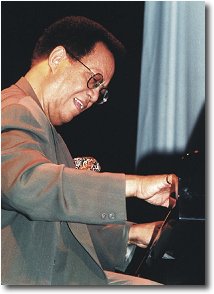 As it sounds clear from Walton's own words, now his
interests concern his own music and the musicians to play it with above all.
Now it is Walton's time to guide and help younger musicians to develop their
qualities. As it sounds clear from Walton's own words, now his
interests concern his own music and the musicians to play it with above all.
Now it is Walton's time to guide and help younger musicians to develop their
qualities.
«Most of the young musicians I've played with are really special.
I've never had problems with any of them, even as far as playing my own
material is concerned. They come to me showing that they know it already. You
can imagine my surprise and satisfaction when that happens! Their knowledge of
my compositions is similar to the one jazz musicians usually have of the pieces
of the most glorious jazz composers, such as Dizzy Gillespie. And I don't think
I'm as popular as Dizzy… Here in Bologna, for instance, the young local
musicians know my music surprisingly well. So we can just meet and play
together immediately. That happens with Piero Odorici and Roberto Rossi, for
instance. Among the young Italian musicians, they are the ones I prefer to play with. Then there is
Steve
Grossman, who is American of course, but who lives not far from Bologna. He
understands my music immediately, as I think it is clear from the recording he
has made with me and my trio for
Red Records [Love Is the Thing]».
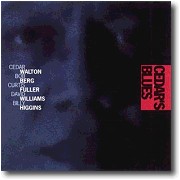 Since the beginning of his career Walton has always
been a composer of first rate music: have you got any memory of pieces such as
Ugetsu
and
Mosaic, which gave their title to two of Art Blakey's best albums?
Yet, Walton has long been identified as a superb performer of standards.
Nowadays that concept wouldn't even make justice of his mastery in handling
someone else's tunes: Walton doesn't just play standards; he recomposes
them through his improvisation technique, suggesting the theme just before
transfiguring it, as in the case of
Over the Rainbow, which was
performed in occasion of the concerts in Bologna (there is a fine quartet
version of it in Cedar's Blues, on
Red Records). Since the beginning of his career Walton has always
been a composer of first rate music: have you got any memory of pieces such as
Ugetsu
and
Mosaic, which gave their title to two of Art Blakey's best albums?
Yet, Walton has long been identified as a superb performer of standards.
Nowadays that concept wouldn't even make justice of his mastery in handling
someone else's tunes: Walton doesn't just play standards; he recomposes
them through his improvisation technique, suggesting the theme just before
transfiguring it, as in the case of
Over the Rainbow, which was
performed in occasion of the concerts in Bologna (there is a fine quartet
version of it in Cedar's Blues, on
Red Records).
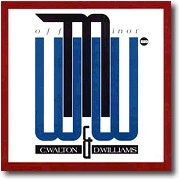 «At the moment one of
the pieces I prefer to play again and again is Thelonious Monk's
Off Minor
[a duo version, with Williams, can be found in
Off Minor, while a trio
version is in The Trio, Vol. 2, both released by
Red Records]. Another
tune I play in different occasions is Stevie Wonder's
Another Star:
rearranged or, if you want, recomposed, it's a good example of how the jazz
repertoire can be enlarged using materials of a very different origin. In any
case, when I play the same piece again and again in front of an audience the
important thing is that the listeners must not have a sensation of déjà vu;
they should be surprised, their interest should be raised any time a standard
is played. That's my aim with standards». «At the moment one of
the pieces I prefer to play again and again is Thelonious Monk's
Off Minor
[a duo version, with Williams, can be found in
Off Minor, while a trio
version is in The Trio, Vol. 2, both released by
Red Records]. Another
tune I play in different occasions is Stevie Wonder's
Another Star:
rearranged or, if you want, recomposed, it's a good example of how the jazz
repertoire can be enlarged using materials of a very different origin. In any
case, when I play the same piece again and again in front of an audience the
important thing is that the listeners must not have a sensation of déjà vu;
they should be surprised, their interest should be raised any time a standard
is played. That's my aim with standards».
We can consider that aim achieved.
Walton's profile should be reshaped taking into
consideration his original compositions. By now, the pianist from Dallas is
himself a source of materials which become the basis for other musicians'
performances. But Walton, as a composer, is still waiting to be fully revealed
to the largest jazz audience; one of the reason for the relativity of his fame
as a composer can be found in the lack of attention and careful analysis of
this side of his musical activity by jazz critics.
«To begin with, in my way of
composing no particular aspect precedes the others nor is more important than
they are. Of course, sometimes the harmonic aspects may come first: it can
always happen to find a great combination of chords! Anyway, in that case the
theme must come too, very near the time of the harmonic definition. None of the
aspects, melodic invention and harmonic structure, can be considered
autonomously: every element, in the act of composition, must be immediately
linked with the others. Of course, it can happen that it's a theme to come to
my mind in the beginning. In this case as well, what really matters is that the
first aspect of the piece to develop doesn't remain isolated. In any
composition there's a marriage of these two things, melody and harmony, which
means that one cannot come without the other, nor in a different time».
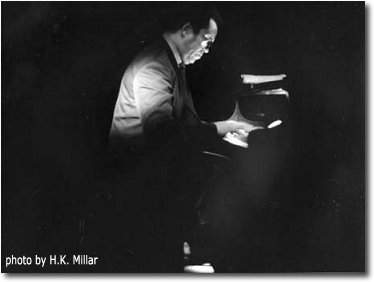 «Most of my compositions are born
directly at the piano. Mental composition in the absence of a keyboard would
have too many inconveniences: I couldn't write down nor could I work with
precision on an idea that came to my mind during any kind of activity far from
the piano. Moreover, I should walk around singing that idea not to forget it…
The piano, instead, allows me to dig into my ideas, while at the same moment I
verify their actual novelty: I want to be sure that what comes out of my head
is really original. Every composition of mine must be new in the content, not
just in the title. Originality comes first: a new piece should never come from
some older one, in one way or another. When I have sketched something new, then
I have to be sure that I really like it and that it can be appreciated by those
who might listen to it after me. When someone is writing music, he must be
guided by the desire to please the others, those who are going to listen to the
composition. Music cannot be written otherwise. Then, I think it's absolutely
important that the piece is appreciated by the musicians who could play it with
me or apart from me. I can say to be definitely satisfied by the quality of one
of my compositions when it raises admiration in those who play it with me: I
adore to judge the quality of my music by reading the musicians' reaction to it
on their faces. If I can read attraction then I'm fully content. That's a good
way to test the value of a piece, receiving much satisfaction at the same time.
If all of that happens, then I can also imagine other musicians appreciating a
composition of mine when I'm not there to see it. Summing it up, I hope jazz
lovers will like to listen to the music I write, while jazz musicians will like
to play it. That would mean the maximum appreciation of what I've done». «Most of my compositions are born
directly at the piano. Mental composition in the absence of a keyboard would
have too many inconveniences: I couldn't write down nor could I work with
precision on an idea that came to my mind during any kind of activity far from
the piano. Moreover, I should walk around singing that idea not to forget it…
The piano, instead, allows me to dig into my ideas, while at the same moment I
verify their actual novelty: I want to be sure that what comes out of my head
is really original. Every composition of mine must be new in the content, not
just in the title. Originality comes first: a new piece should never come from
some older one, in one way or another. When I have sketched something new, then
I have to be sure that I really like it and that it can be appreciated by those
who might listen to it after me. When someone is writing music, he must be
guided by the desire to please the others, those who are going to listen to the
composition. Music cannot be written otherwise. Then, I think it's absolutely
important that the piece is appreciated by the musicians who could play it with
me or apart from me. I can say to be definitely satisfied by the quality of one
of my compositions when it raises admiration in those who play it with me: I
adore to judge the quality of my music by reading the musicians' reaction to it
on their faces. If I can read attraction then I'm fully content. That's a good
way to test the value of a piece, receiving much satisfaction at the same time.
If all of that happens, then I can also imagine other musicians appreciating a
composition of mine when I'm not there to see it. Summing it up, I hope jazz
lovers will like to listen to the music I write, while jazz musicians will like
to play it. That would mean the maximum appreciation of what I've done».
Walton's desires have long been a reality in the
international jazz scene. His compositions have begun to enter in the programs
of other musicians. Things could not have been different, since the first
moment Walton's pieces entered Blakey's repertoire to remain in it.
«I don't
hide my satisfaction any time I come to know of somebody who plays my music.
Any time it happens it is as though they were paying me a compliment. It means
that other musicians are attracted by my music as I am by that of Duke
Ellington or Thelonious Monk when I choose to play them. In such occasions the
ultimate sense of a composer's activity is achieved: being played and listened
to as much as possible».
By now Walton's catalogue of compositions has grown
quite large, consisting of titles from all the different periods of his career.
«I was thirty, forty, fifty, sixty: in any of these periods I had a preference
for some particular composition of mine rather then for some other. Of course,
the tunes I was more attracted by changed with the passing of time. Now I
started to look back, reorganising the older compositions of my catalogue, so
that they might look fresh again. Differently from the past, now I see all my
compositions not as single pieces but as a body of works: they assume a
different meaning if I look at them altogether rather than one at the time. I
can still think about adding new pieces to this collection, but I also feel
that my first works are assuming a different meaning from the one they had when
I had just composed them. As I said, I can elaborate these older pieces again
in order to renew them: this is the activity I'm more concerned with in this
period».
The fact of having reached his goals as an artist,
together with that of having the time to go on specifying and deepening his own
musical world, makes so that Walton doesn't see the jazz scene as an arena in
which musicians compete to impose their own music. «I cannot say I have an
opinion of mine about my colleagues, not even about other jazz pianists. I
leave the job of understanding today's jazz music scene to the critics.
Noticing and explaining similarities and differences between the various
musicians is their duty. On my part, the best thing I can do is concentrating
on my musical path, which is already tracked with extreme precision».
Cedar Walton's search for a musical identity has then
left its place to the enjoyment of its results, to the observation and
reshaping of the work done. Any new musical gesture, on both sides: composition
and performance, is not obliged to be innovative: Walton can now afford to
teach his lesson in jazz by just giving expressive shape to a personal style
which is already fully developed. That is what he demonstrated in the concerts
held in Bologna: it seemed as though the keyboard's extension couldn't have the
slightest limit for him, since he was not exploring it in its width but in its
inner resources, joining hands so that chords could coagulate with each other
and with the melody. The wide vault of the improvisation was thus hiding in its
shade the most profound digging that Walton was doing in his own musical
personality. He was reaching the greatest peak of bop playing (in terms of
swing, phrasing, richness of colour in the touch) through an exaltation of the
most personally intimate character of his musical interpretation.
 Among Walton's future projects there is the fulfilment
of an agreement with the High Note label for a series of three recordings. The
first one, in quartet with Vincent Herring (alto sax and flute), David Williams
(bass) and Kenny Washington (drums), has just been released [Promise
Land, N.d.R.]. In the next two
years Walton should proceed recording a trio and a solo album, the latter of
which would add a new presence to Walton's output of solo performances: we
remind the little known
Piano Solos
(on Clean Cuts) and the more famous
and refined Blues for Myself
(on
Red Records). Among Walton's future projects there is the fulfilment
of an agreement with the High Note label for a series of three recordings. The
first one, in quartet with Vincent Herring (alto sax and flute), David Williams
(bass) and Kenny Washington (drums), has just been released [Promise
Land, N.d.R.]. In the next two
years Walton should proceed recording a trio and a solo album, the latter of
which would add a new presence to Walton's output of solo performances: we
remind the little known
Piano Solos
(on Clean Cuts) and the more famous
and refined Blues for Myself
(on
Red Records).
«I'm deciding about who
is going to be part of my trio for the High Note recording. I would like to
have Ray Mantilla and Chucho Martinez: that would be a trio with a Latin soul».
Here is a surprise for those who thought that a pianist who has reached the
wisdom of Cedar Walton could just be satisfied with it: Walton's creativity
cannot just be confined within the limits of already conquered stylistic goals. We can foresee Walton's encounter with a
style very much different from his bop preferences: latin jazz. There
seems to be a bet in the air and Walton will probably have Mantilla at his side
to gamble with. That would be their first recording together, after some live
playing.
Daniele Cecchini
Insert a comment
©
2000 - 2001 Jazzitalia.net - Daniele Cecchini - Red Records - All Rights reserved
|
© 2000 - 2026 All the material published on Jazzitalia is exclusively owned by the author. Moreover it is protected by International Copyright, so it is forbidden any use of it which isn't authorised by the rights' owner.
|
Questa pagina è stata visitata 6.437 volte
Data ultima modifica: 17/12/2002

|
|

